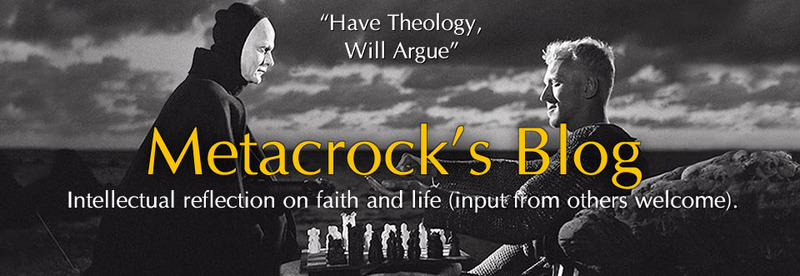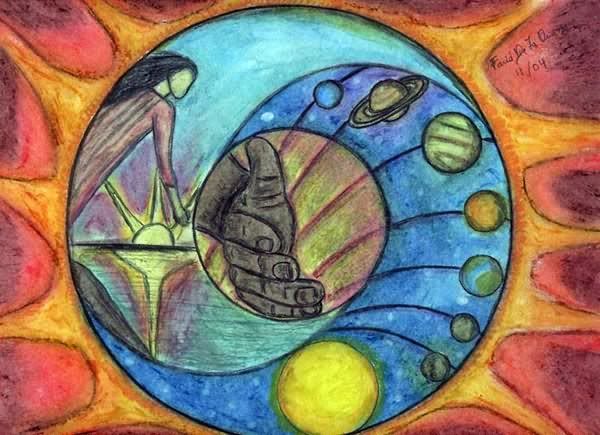The atheists with whom I converse on the net seem to think that I really believe the studies I conclude that God exists they make a big thing of pointing out that they don/t. Of course they don't claim they do but those atheists just don't listen whenI explain my argument.
"I am skeptical" says:
I'm not belittling anything. I'm telling you that personal experience does not constitute empirical evidence. I'm telling you that all those studies make no such claim, and you are reading that into them. They don't show the causation that you infer from them. You can have all the experiences you like. Be happy with it. I have experiences, too. But don't try to tell a scientist that it's empirical evidence, because it isn't. And all the positive effects your studies point out are not the product God unless you can show actual evidence that they are. Those studies don't say that. You haven't shown it.[1]
The problem is we have two different concepts of reality working here, Notice his major concern is that there be scientific proof of God, Anythig short of that is not proof. This is not science but ideology. Science does not prescribe itself as the only form of knowledge, that is the ideology of scientism.I work by a new standard of proof, called "rational warrant." Rather than prove absolutely that God exists I seek to warrant belief. Atheists criticize fait by cayingitis believing things without a reason, That implies that having a good reason should be enough. This argument supplies a good reason to believe.
Why should we assume that such experiences are experiences of the divine? The first reason is because the content of the experience is largely that of the divine. Even when the experience is interpreted by the receiver not be about God the receiver has been known to act in way consistently with belief in God, and the experience described is the same experience as those described by those who say ‘this was God.’ Ergo it’s just a matter of interpretation. The vast majority of those who have these experiences do believe they are about God.
[2]
In a survey of thousands of people who reported having experienced personal encounters with God, Johns Hopkins researchers report that more than two-thirds of self-identified atheists shed that label after their encounter. Moreover, the researchers say, a majority of respondents attributed lasting positive changes in their psychological health—e.g., life satisfaction, purpose, and meaning—even decades after their initial experience.[3]
Secondly, there is a voluminous and ancient tradition of writing about experiences by people from all over the world, and the brunt of this tradition is that it’s an experience of the divine. Literary and philosophical works such as Mysticism by Evelyn Underhill,
[4]
Experiences that people describe as encounters with God or a representative of God have been reported for thousands of years, and they likely form the basis of many of the world's religions," says lead researcher Roland Griffiths, professor of psychiatry and behavioral sciences at the Johns Hopkins University School of Medicine. "And although modern Western medicine doesn't typically consider 'spiritual' or 'religious' experiences as one of the tools in the arsenal against sickness, our findings suggest that these encounters often lead to improvements in mental health."[5]
The works of W.T. Stace
[6] and many other such writings which catalogue these experiences, and many more works of the experiences of individual mystics by the mystics themselves reflect t. Thirdly, grounded in empirical evidence, the universal nature of such experiences implies the experience of a source external to the human mind encountered by all who have such experiences. When I say “external” I mean it originates externally but is experienced internally. This includes human brain structure and brain chemistry as a conduit not that it circumvents natural processes. The works of W.T. Stace are very influential. He shows that, as Ralph Hood Jr. put it, “within and eventually outside of the great faith traditions mysticism has flourished.”
[7] Stace offers five characteristics that demonstrate the commonalities to mystical experience; these are characteristics that are found universally in all cultures and in all forms of mystical experience:
The contemporary interest in the empirical research of mysticism can be traced to Stace’s (Stace, 1960) demarcation of the phenomenological characteristics of mystical experiences (Hood, 1975). In Stace’s conceptualization, mystical experiences had five characteristics (Hood, 1985, p.176):
1. The mystical experience is noetic. The person having the experience perceives it as a valid source of knowledge and not just a subjective experience.
2. The mystical experience is ineffable, it cannot simply be described in words.
3. The mystical experience is holy. While this is the religious aspect of the experience it is not necessarily expressed in any particular theological terms.
4. The mystical experience is profound yet enjoyable and characterized by positive affect.
5. The mystical experience is paradoxical. It defies logic. Further analysis of reported mystical experiences suggests that the one essential feature of mysticism is an experience of unity (Hood, 1985).
The experience of unity involves a process of ego loss and is generally expressed in one of three ways (Hood, 1 976a). The ego is absorbed into that which transcends it, or an inward process by which the ego gains pure awareness of self, or a combination of the two.
[8]
The experiences themselves are real and they have a total transformative effect upon thelifeofthe experoecer Thisisnot a trick or psychological problem it's real. The question is: what inexperienced? We have major reasons to think it's God:
(1)We would not even have religion without it. What are the odds this "imaginary" thing would affect the validity of the most hated aspect of life for atheists?
(2) The effects of the experience match the major promises made by God about redemption.
(3) the experiences themselves are the same the world over despite different names of deities,which indicates they are all dealing with the same reality.
"But don't try to tell a scientist that it's empirical evidence, because it isn't." The studies themselves are empirical in the scientific sense, the researchers say so."Three empirical instruments have been developed to date. They are the Mysticism Scale by Hood (1975), a specific question by Greeley (1974) and the State of Consciousness Inventory by Alexander (1982;
[9] the data is empirical we are extrapolating from that.This is done in science as with smoking causes cancer before they had a causal mechanism.
The experience of mystical consciousness itself is empirical: Definitions from Oxford Languages ·
em·pir·i·cal
/imˈpirək(ə)l/
adjective
based on, concerned with, or verifiable by observation or experience rather than theory or pure logic.
"they provided considerable empirical evidence to support their argument"
[10] Webster:"originating in or based on observation or experience. empirical data. 2. : relying on experience or observation alone often without due regard for system and theory.``
[11] In scientific terms: "Empirical research is based on observed and measured phenomena and derives knowledge from actual experience rather than from theory or belief.Jan 5, 2024"
[12] That wpi;d still indclude the actual experience of God as emirical.
Science offers it's specialized version of empirical that fits scientific learning. But why should that be the standard by which all belief is measured? Even so the data is scientifically empirical, we are extrapolating to ask what does that data teach us?
Notes
[1] "Is there evidence for an infinite loving God?"
Metacrock's BlogFEBRUARY 03, 2024
https://metacrock.blogspot.com/2024/02/is-there-evidence-for-infinite-loving.html
[2] Joseph Hinman,
Trace of God:Rational warrant for Belief.Colorado Springs:Grand Viaduct, 2014.
[3]Vanessa McMains.
"Profound Experiences Linked to Mental Health Benifits," HUB,Johns Hopkins Unversity. Apr 26, 2019,
https://hub.jhu.edu/2019/04/26/experiencing-god-psychedelics-mental-health/
[4] Evelyn Underhill,
Mysticism: A study on the Nature and Development of Man’s Spiritual consciousness. New York: Dutton, 1911.
[5]OP Cit, Vanessa McMains
[6] W.T. Stace,
Teachings of the Mystics: Selections from the Greatest Mystics and Mystical Writers of the World. New American Library 1960. A good General overview of Stace’s understanding of mysticism is Mystical Experience Registry: Mysticism Defined by W.T. Stace. found onine at URL: http://www.bodysoulandspirit.net/mystical_experiences/learn/experts_define/stace.shtml
[7] Ralph Hood Jr. “The Common Core Thesis in the Study of Mysticism.” In
Where God and Science Meet: How Brain and Evolutionary Studies Alter Our Understanding of Religion. Patrick Mcnamara ed. West Port CT: Prager Publications, 2006, 119-235. Google books on line version: URL http://books.google.com.cu/books?id=0bzj3RtT3zIC&printsec=frontcover&source=gbs_ge_summary_r&cad=0#v=onepage&q&f=true visited 8/20/2012
[8]Robert J. Voyle, “The Impact of Mystical Experiences Upon Christian Maturity.” originally published in pdf format: http://www.voyle.com/impact.pdf. google html version here: http://64.233.161.104/search?q=cache:avred7zleAEJ Voyle is quoting Hood in 1985, Hood in return is speaking Stace.
:www.voyle.com/impact.pdf+Hood+scale+and+religious+experience&hl=en&gl =us&ct=clnk&cd=2&ie=UTF-8\\
[9]Vanessa McMains, op cit
[10] About 32,400,000 results (0.32 seconds)
based on experiments or experience rather than ideas or theories. empirical evidence/knowledge/research.empirical adjective - Oxford Learner's Dictionaries
Oxford Learner's Dictionaries
https://www.oxfordlearnersdictionaries.com › english
[11]Empirical, Definition & Meaning - Merriam-Webster
https://www.merriam-webster.com › dictionary › empirical
[12]"Empirical Research in the Social Sciences and Education," Penn state University libraries
https://guides.libraries.psu.edu ›Jan 5, 2024



